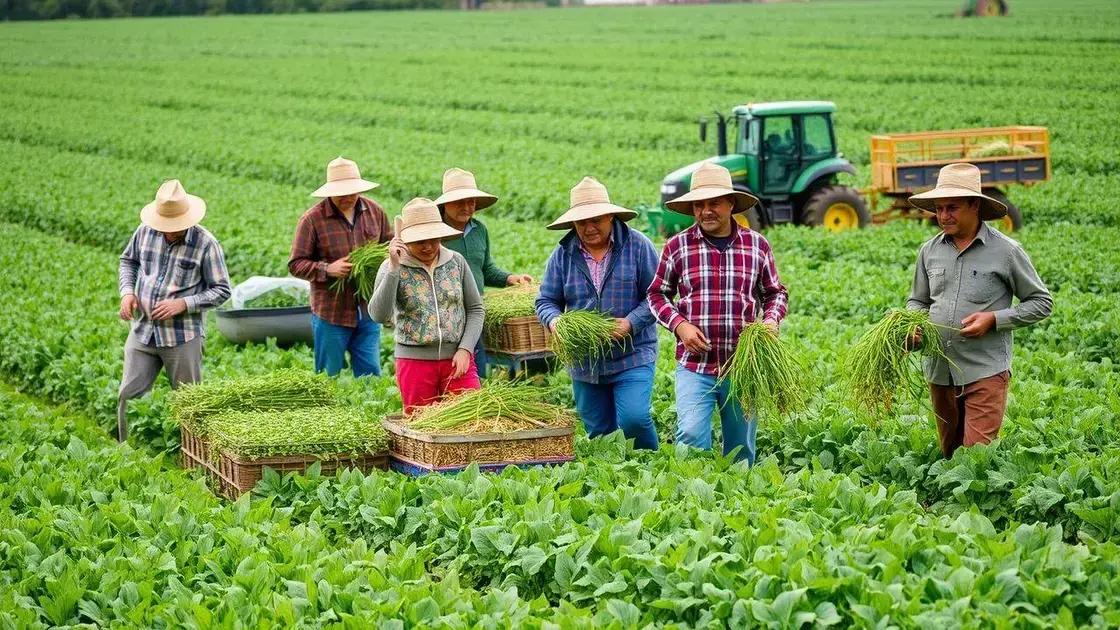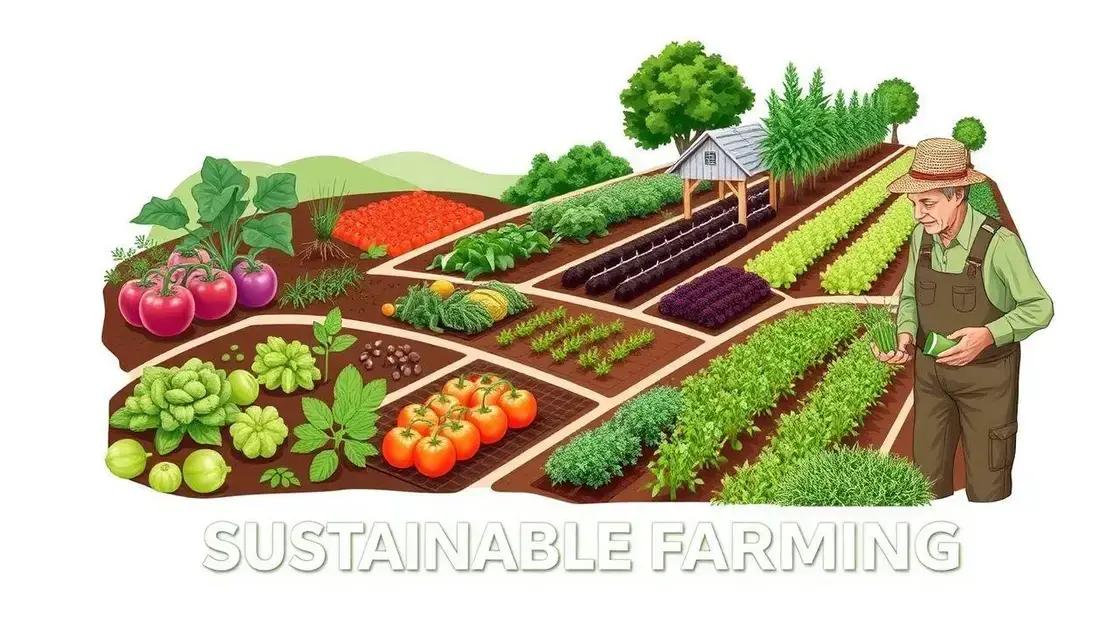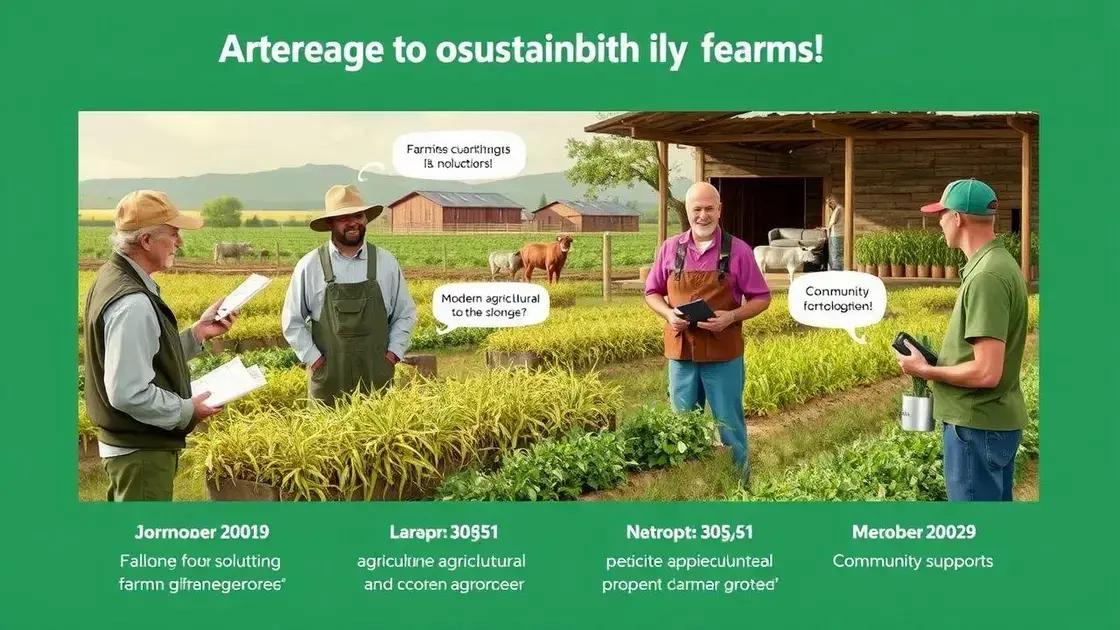Sustainable agriculture practices US: a guide for farmers

Sustainable agriculture practices in the US enhance environmental health and farming efficiency by utilizing innovative technologies, crop diversity, and educational resources to overcome challenges and ensure food security.
Sustainable agriculture practices US are more than just a trend; they’re a necessity for future farming. Have you ever thought about how these methods can transform both yields and the environment? Let’s dive into how these practices are reshaping agriculture.
Understanding sustainable agriculture practices
Understanding sustainable agriculture practices involves recognizing various methods that promote farming efficiency while preserving the environment. These practices focus on reducing agricultural inputs, enhancing biodiversity, and improving the soil’s health.
Core Principles of Sustainable Agriculture
Sustainable agriculture is built on several core principles that guide farmers towards responsible land use.
- Soil health: Maintaining soil quality is essential for long-term productivity.
- Biodiversity: Planting diverse crops helps prevent disease and pest issues.
- Water conservation: Efficient water management saves resources and protects ecosystems.
- Reducing chemical use: Minimizing pesticides and fertilizers leads to healthier environments.
By focusing on these principles, farmers can create systems that benefit both their operations and the ecosystem. Another important aspect is crop rotation, which enriches the soil and interrupts pest cycles. Farmers often switch crops annually, allowing fields to rest and recover. This method not only boosts soil nutrients but also fosters a healthier overall environment.
Integrating Technology
Many modern farmers are leveraging technology to enhance their sustainable practices. Innovations like precision agriculture enable the careful application of inputs, ensuring they reach only where needed. This targeted approach reduces waste and promotes efficiency, proving that sustainability and technology can work hand in hand.
Furthermore, the use of data analytics allows farmers to make informed decisions based on real-time information about weather patterns and soil conditions. These proactive measures lead to more resilient farming operations that can adapt to changing climates.
As awareness grows, many consumers are also looking for sustainably sourced products. This trend encourages farmers to adopt sustainable methods, knowing their efforts will resonate in the market. Overall, understanding and implementing sustainable agriculture practices is essential for ensuring a viable future for farming.
Benefits of sustainable farming techniques

The benefits of sustainable farming techniques are significant for both farmers and the environment. These methods not only increase productivity but also contribute to long-term ecological health. Farmers who adopt sustainable practices often see improved yields and healthier crops, as these techniques focus on natural processes and resources.
Environmental Advantages
One key benefit of sustainable farming is the positive impact on the environment. Practices such as crop rotation and cover cropping enhance soil quality, reduce erosion, and lower the need for chemical inputs. By supporting biodiversity, farmers also cultivate a more resilient ecosystem.
- Soil conservation: Maintaining topsoil protects against erosion and nutrient loss.
- Water preservation: Sustainable practices optimize water usage, benefiting both crops and local water sources.
- Energy efficiency: Using renewable resources helps reduce fossil fuel dependency.
- Habitat creation: Diverse planting attracts beneficial insects and wildlife.
Additionally, sustainable farming improves the health of local communities. Consumers are increasingly looking for food products that align with their values, favoring those produced through sustainable practices. This demand encourages more farmers to implement eco-friendly methods, essentially creating a cycle of positive change.
Economic Benefits
While some may view sustainable practices as more costly initially, they often lead to long-term savings. By reducing the reliance on expensive chemical fertilizers and pesticides, farmers can save money while protecting their land. Moreover, crops raised sustainably tend to command higher prices in the market, increasing profitability.
Farmers also benefit from increased resilience against market fluctuations. With sustainable methods, they can diversify their crop production, reducing the impact of any single crop failure. This diversity not only enhances income stability but also promotes a robust agricultural system.
With a focus on sustainability, farmers can create a legacy of land stewardship while addressing the challenges of modern agriculture. In the long run, embracing sustainable farming techniques results in healthier food systems, thriving ecosystems, and economic viability.
Innovative technologies in sustainable agriculture
Innovative technologies play a crucial role in the evolution of sustainable agriculture. These advancements help farmers improve efficiency, reduce waste, and promote environmental conservation. By integrating technology into their practices, farmers can make informed decisions that lead to better crop yields and healthier ecosystems.
Precision Agriculture
One of the most significant innovations in sustainable farming is precision agriculture. This approach uses technology to monitor and manage field variability in crops. Farmers utilize GPS mapping, drones, and sensors to assess soil health, moisture levels, and crop conditions.
- Data collection: Sensors gather real-time data, enabling farmers to respond to conditions quickly.
- Site-specific management: Adjusting practices based on specific field areas increases efficiency.
- Resource optimization: Precision agriculture minimizes waste of water, fertilizers, and pesticides.
By utilizing these tools, farmers can make better decisions that enhance productivity while minimizing environmental impact. Additionally, drones offer unique perspectives for monitoring crops and analyzing growth patterns, allowing quick identification of issues.
Vertical Farming
Another exciting advancement is vertical farming. This method involves growing crops in stacked layers or vertically inclined surfaces, often in controlled environments. Vertical farms can produce food in urban areas, reducing transportation emissions.
These farms utilize technologies like hydroponics and aeroponics, allowing plants to grow without soil. This not only conserves space but also uses significantly less water compared to traditional farming. By maximizing urban space, vertical farms can address food security concerns in densely populated areas.
Furthermore, advancements in artificial intelligence and machine learning are helping farmers predict crop yields and manage risks. These technologies analyze data from various sources, helping farmers create more resilient growing strategies. Integrating these innovations into farming practices fosters a sustainable future where food production aligns with ecological goals.
Challenges and solutions in sustainable farming

Challenges in sustainable farming are common, but they also present opportunities for innovation and growth. Understanding these obstacles is crucial for farmers who want to adopt more sustainable practices. One major challenge is the initial cost of implementing new technologies and methods. Many farmers may hesitate to invest in eco-friendly practices due to upfront costs.
Addressing Financial Barriers
Finding solutions to reduce financial risk can encourage more farmers to transition to sustainable farming. Some potential approaches include:
- Government subsidies: Financial assistance can offset the costs of purchasing new equipment or implementing sustainable practices.
- Grants and loans: Programs that provide low-interest loans enable farmers to invest in sustainable technologies.
- Community funding: Local initiatives can help share costs among farmers interested in sustainable methods.
Another significant obstacle is the knowledge gap. Many farmers lack access to information about sustainable farming techniques, making it difficult to change established practices. Educating farmers about the benefits and methods of sustainability can empower them to adopt new practices.
Enhancing Education and Training
To tackle this, extension services and agricultural schools can offer workshops on sustainable techniques. These programs can cover key topics such as soil management, crop diversity, and integrated pest management. By providing hands-on training, farmers can see the benefits of sustainable practices firsthand.
Additionally, farmers can benefit from engaging with local agricultural organizations. These groups often provide resources and networking opportunities that connect farmers with experts and peer support. Learning from others who have successfully transitioned to sustainable methods can inspire and motivate farmers to make necessary changes.
Finally, climate change poses a considerable challenge for sustainable farming. Unpredictable weather patterns can impact crop yields and exacerbate existing challenges. Farmers need to develop resilience in their operations to adapt to these changes. Implementing crop rotation, using drought-resistant varieties, and improving water management can help.
Ultimately, while challenges exist in sustainable farming, there are numerous solutions available. By addressing financial barriers, enhancing education, and preparing for climate impacts, farmers can navigate the path toward more sustainable practices successfully.
FAQ – Frequently Asked Questions about Sustainable Agriculture
What are the main benefits of sustainable agriculture?
Sustainable agriculture benefits the environment by reducing pollution and conserving resources, while also enhancing crop yields and economic viability for farmers.
How can technology aid in sustainable farming?
Technology helps through precision agriculture, which utilizes data and sensors to optimize farming practices, improving efficiency and reducing waste.
What challenges do farmers face in adopting sustainable practices?
Farmers often face financial barriers, a lack of knowledge, and the impacts of climate change when trying to implement sustainable methods.
How can education improve sustainable farming practices?
Education provides farmers with the necessary knowledge and skills to implement sustainable techniques effectively, often through workshops and training programs.






